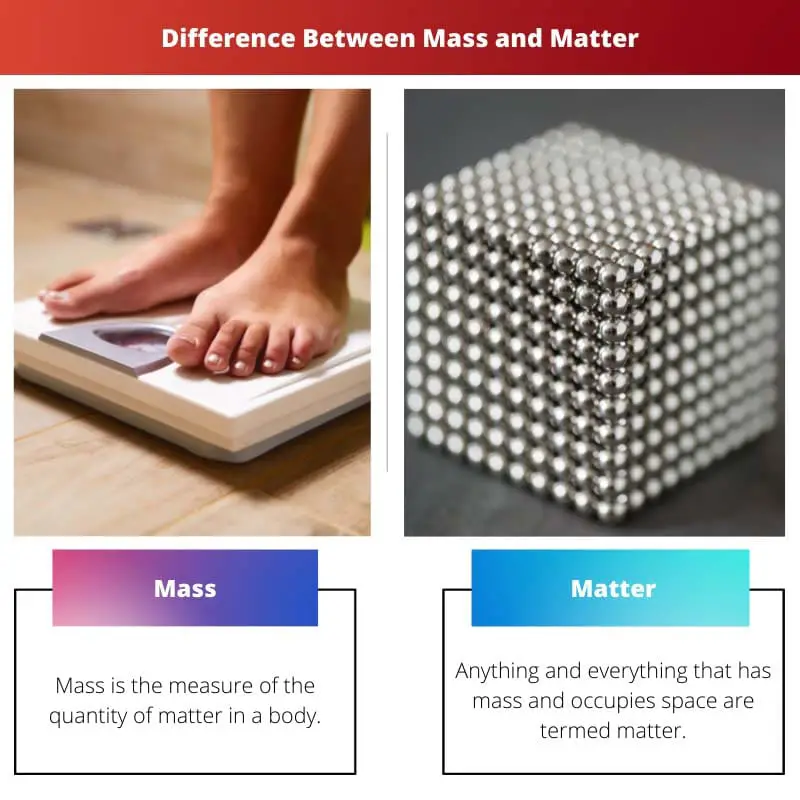Both Mass and Matter are two terms that help in forming the foundation of not only chemistry but also physics. Students must understand both of these concepts quite clearly, as many sometimes get confused with these two terms.
Some even use these terms interchangeably as they don’t have a clear concept of the latter.
Key Takeaways
- Mass measures the amount of matter in an object and is measured in grams or kilograms.
- The matter is anything that has mass and occupies space, including atoms, molecules, and particles.
- Mass and matter are related concepts, but the mass is a specific measure of matter, while matter encompasses all substances that have mass and take up space.
Mass vs Matter
The amount of matter in a body is measured by mass. Mass is not visible. The unit used to measure mass is kg. A mass cannot be changed. Anything which occupies space is called matter. Matter can be seen. Different units can be used to measure matter. The matter is categorized into three main forms. Chemical reactions can be done to change matter.

Mass is a significant and major characteristic of all matter. When force is applied, the smaller more the mass is, the lesser is the resultant change. The different types of the latter are inertial mass, active gravitational mass, and passive gravitational mass.
And the terms weight and mass though sometimes are confused with being the same, are separate phenomena.
Matter can be defined as anything, and everything that occupies space has volume and has mass. All objects we can see and touch and things around us are termed matter.
The types of physical forms of matter can be either solid, liquid, or gas. Though there has been a lot of advancement in technology and science still, the concept of the matter remains inadequate.
Comparison Table
| Parameters of Comparison | Mass | Matter |
|---|---|---|
| Definition | Mass, in simple terms, is the measure of the quantity of matter in a body. | Anything and everything that has mass and occupies space are termed matter. |
| Visibility | It cannot be seen. | The matter is noticeable and visible. |
| Measuring Unit | Kilogram or Kg | Diverse varieties of units such as volume, mass, and weight. |
| Different forms | Several applications are similar to active and passive; gravitational mass and inertial mass. | Mainly three forms, i.e., Solid; Liquid; Gas |
| Changes | Perpetually constant and can never change. | Matter can change into an original and new product due to some chemical reaction. |
What is Mass?
Mass can be defined as an attribute of a physical body and also as a measure of its endurance to and against acceleration when a net force is utilized. Sometimes the mass of an object also helps in determining the strength of its gravitational attraction force toward other bodies or items.
The SI unit of the latter is Kg or Kilogram. Many presume that mass and weight are the same, but with reference to physics, they are not.
Although interestingly, the mass of an object is determined with the help of the measuring instruments used for weight evaluation. They prefer using the balance scale rather than the spring scale.
Many aspects can be used to measure the mass. However, Some theorists and scientists have considered and theorized that the beforementioned aspects can be independent of each concerning a few factors.
The object’s mass helps determine its acceleration in the proximity of an applied force. The inertial mass and the inertia represent the property of physical bodies at their quantitative and qualitative levels, respectively.
Concerning Newton’s second law of motion, we understand that if or when a body of a constant mass (m) is subjected to a singular force (f), the acceleration (a) produced is given by f/m.

What is Matter?
Matter can be defined as any and every substance that contains matter and occupies space that has volume. The matter is composed of atoms. Such atomic matters are sometimes referred to as ‘ordinary matter.’ One can say that the matter is everything that is around us.
The properties of the latter include various attributes that can be measured. These attributes have a vast range of modifications like density, volume, length, melting point, hardness, odor, and many more factors.
Generally, properties of matter can be distinguished as either extensive or intensive. It can also be chemical or physical.
Extensive properties like volume and mass depend on the quantity of matter that is being measured.
One also deals with physical and chemical changes when dealing with the matter. Physical changes are the term for the processes that are undertaken during the change of the appearance of a substance.
Whereas chemical changes can result in a substance changing into a new substance with a brand-new chemical formula. An example of physical change is the boiling of water, whereas an example of chemical change is a mixture of two chemicals and making a new product.
The matter is sometimes also known to be composed of antiparticles and is referred to as antimatter.

Main Differences Between Mass and Matter
- Mass, in simple terms, can be defined as the measure of the quantity of matter present in a body, whereas matter is anything and everything that contains mass and occupies space.
- Mass cannot be seen, whereas matter is visible and hence noticeable.
- The measuring unit of mass is Kilogram or Kg, whereas, in the case of matter, it concerns diverse varieties of units such as volume, mass, and weight.
- The changes associated with mass are perpetually constant and do not change ever. But in the case of matter, it can change into a new and original product resulting from chemical reactions.
- Examples of mass: The mass of Planet Mercury is 3.302 x 10 to power 23. Examples of Matter: An apple and Water

- https://books.google.com/books?hl=en&lr=&id=pcb9BAAAQBAJ&oi=fnd&pg=PP1&dq=mass++in+chemistry&ots=K8kO1kh_GG&sig=h0-aVVEk8xseVMuV9bx7EkE1g6Q
- https://www.jstor.org/stable/1634781

The comparison of extensive and intensive properties of matter is particularly intriguing and gives a comprehensive understanding of the topic.
It’s important to remember that mass and matter are interrelated concepts but they are not the same.
The explanations about what mass and matter are and how they’re measured are very clear and concise.
This article provides a clear and well-organized summary of the concepts of mass and matter.
The comparison table in the article is especially useful for highlighting the differences between mass and matter.
The distinction between mass and matter has been explained in a very detailed and thorough manner in this article.
Understanding the distinction between mass and matter is essential for anyone studying physics or chemistry.
This article does a great job of explaining the difference between mass and matter, something that even well-educated people sometimes confuse.
The article does a great job at breaking down complex scientific topics and explaining them in an approachable way.
I appreciate the way this article has been structured to provide a comprehensive overview of mass and matter.